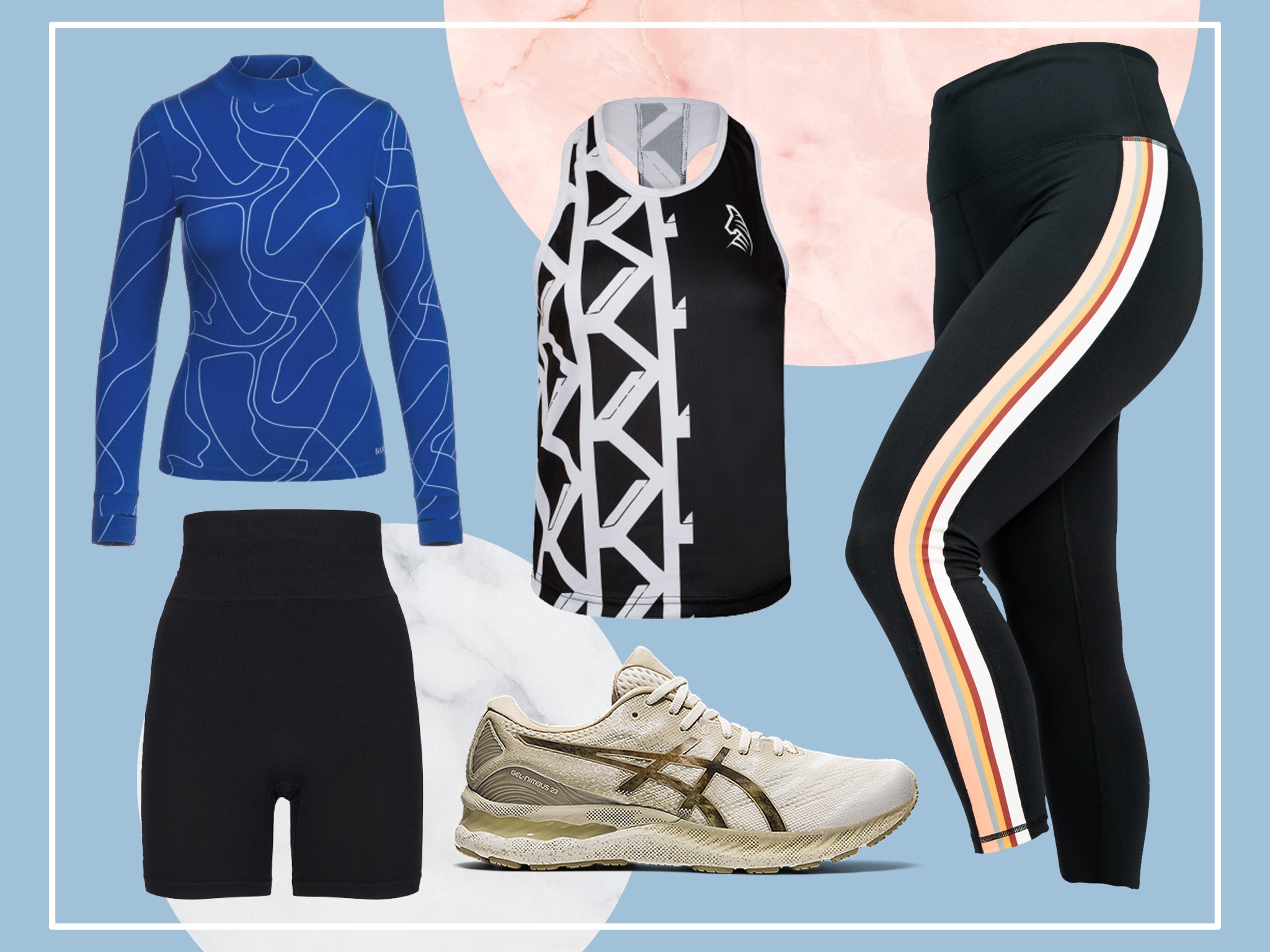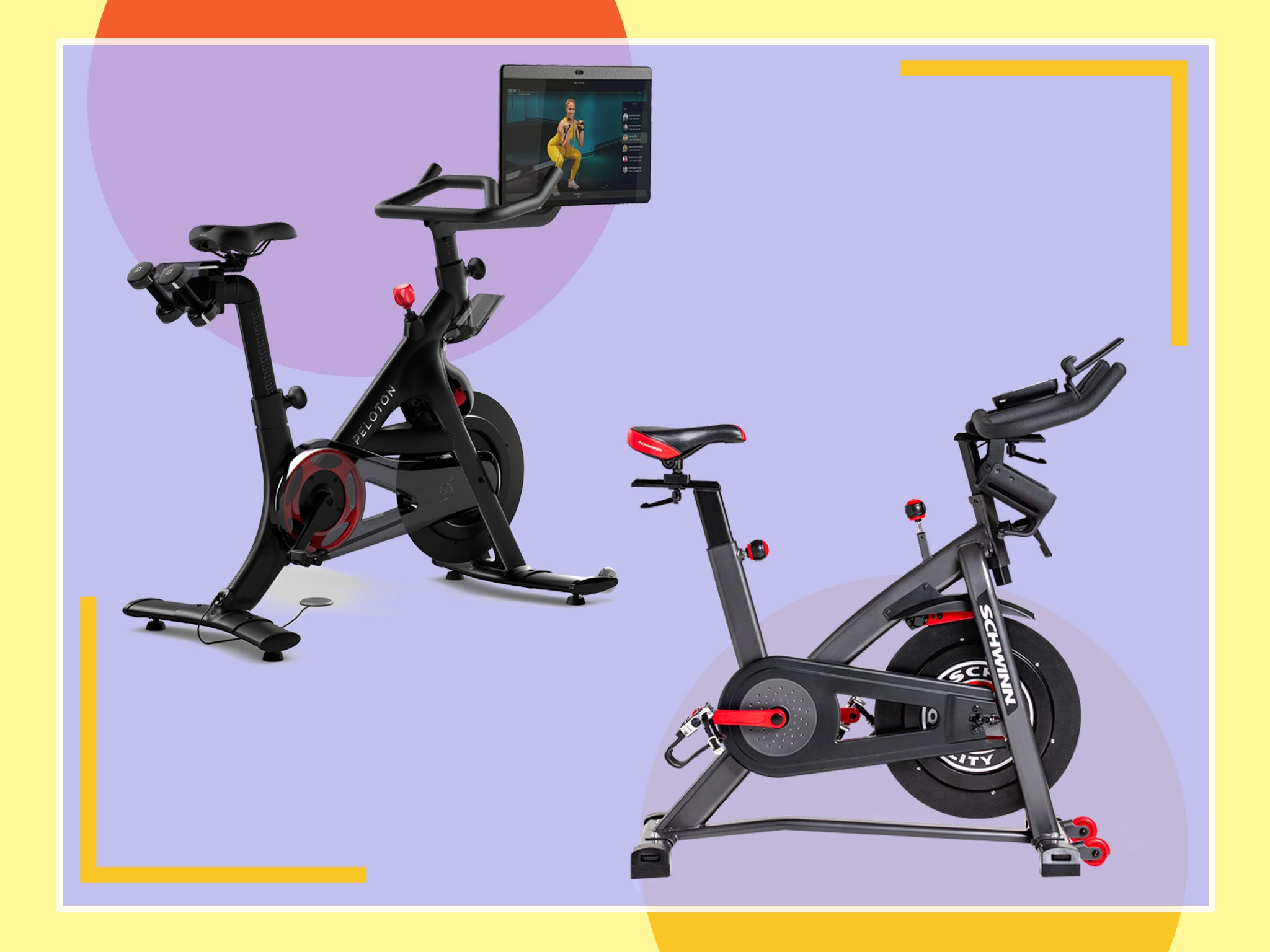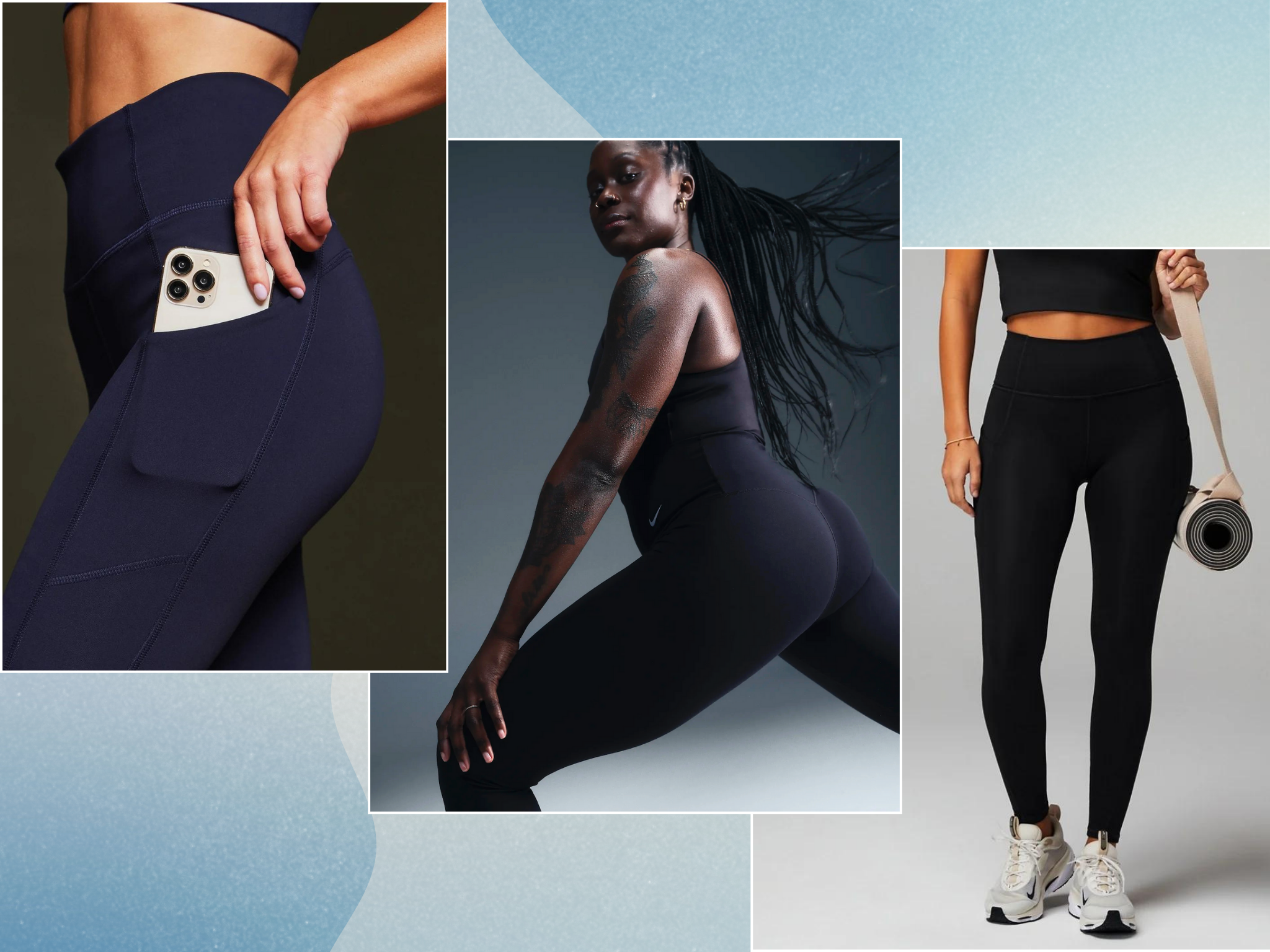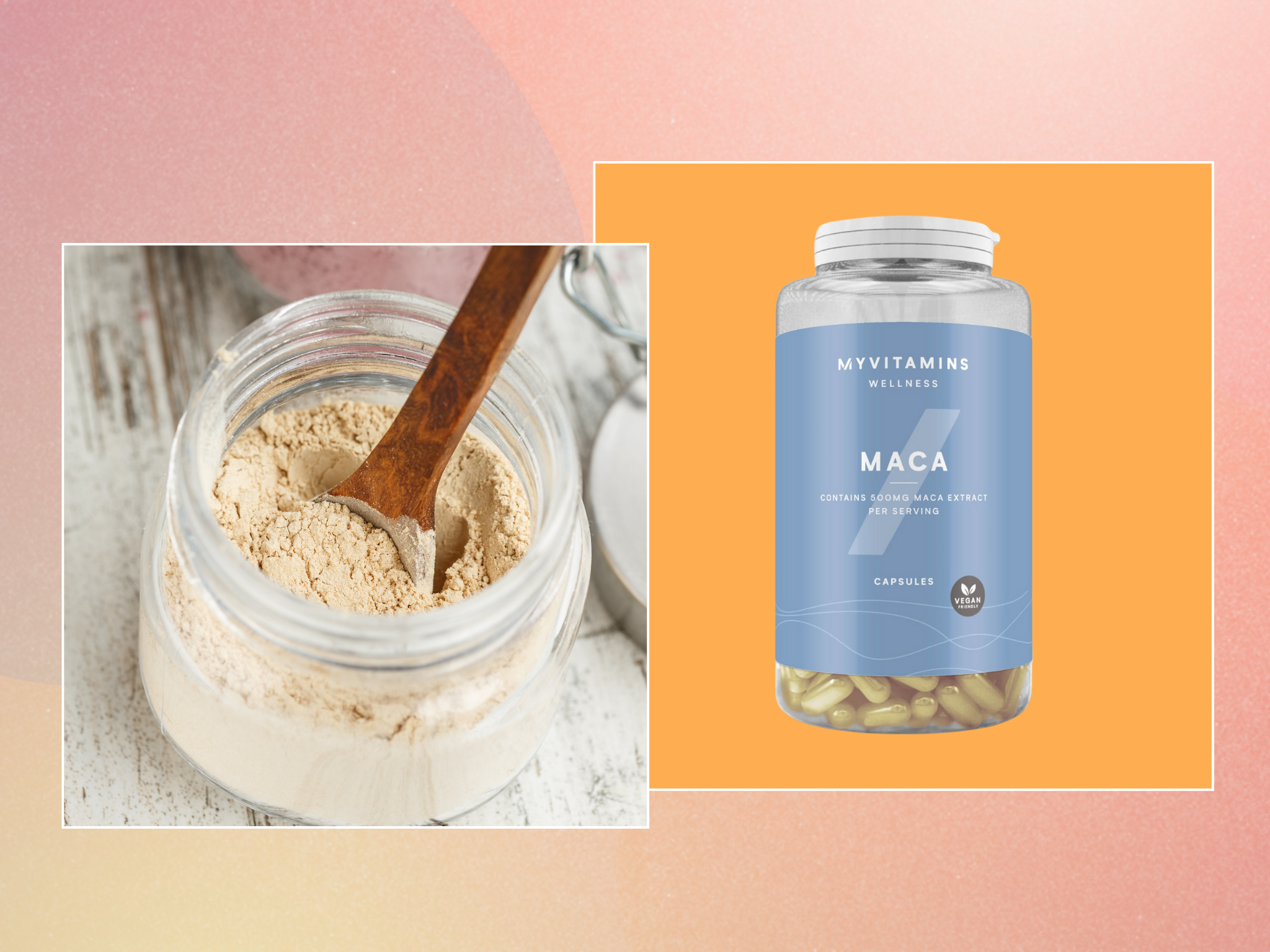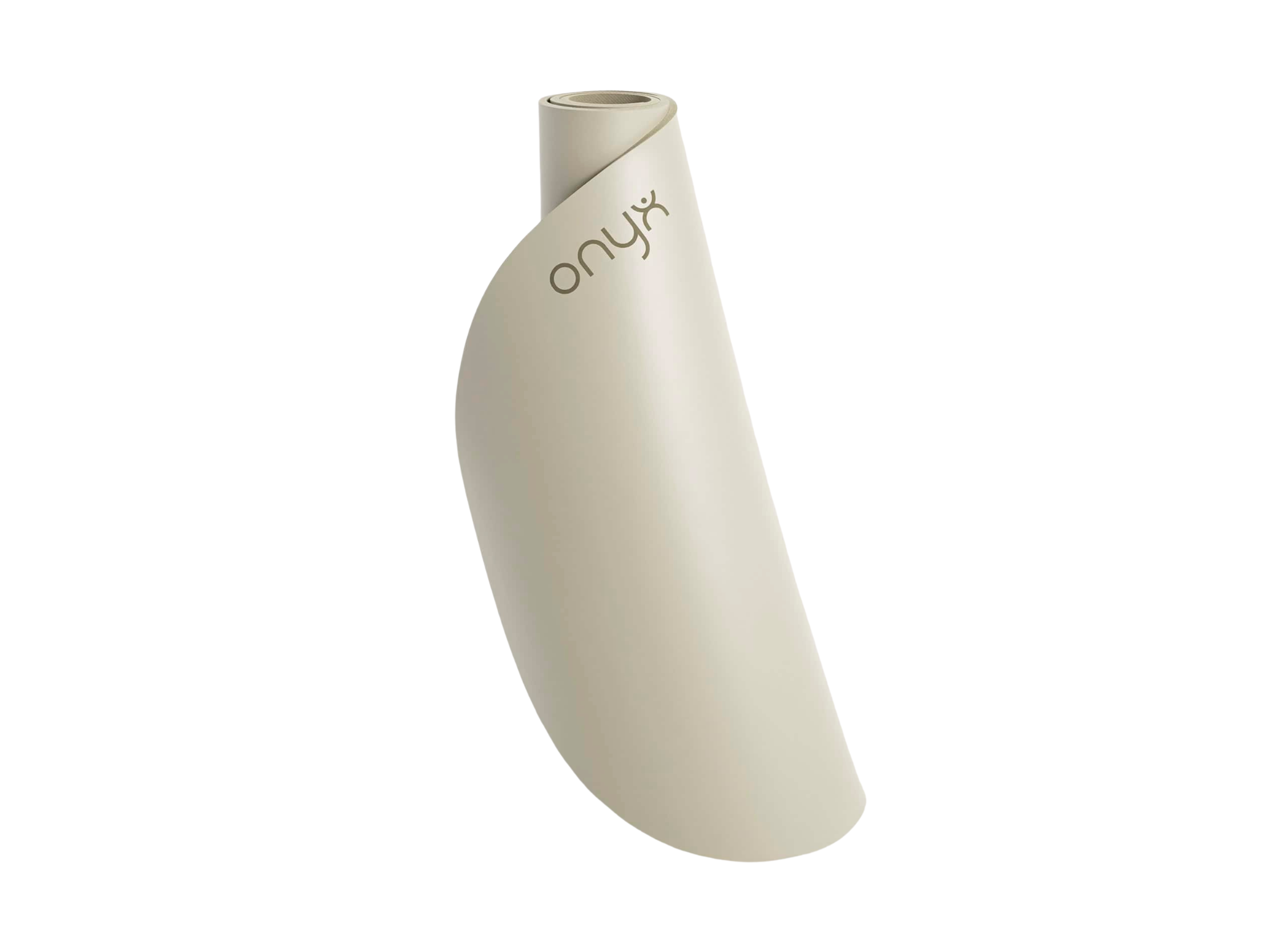
The Independent's journalism is supported by our readers. When you purchase through links on our site, we may earn commission.
14 best yoga mats for at home and in the studio
From travel mats to cork-covered finds, they’re the only piece of equipment you really need

Whether you’re a dedicated yogi capable of flowing seamlessly from downward dog into crow pose, or you’re far more comfortable lying on your back in Savasanah, the only thing you really need for your practice is a decent yoga mat. There are far fewer bells and whistles in yoga than other sports and disciplines, however, the quality of your mat is essential.
While there are many to choose from, you’d be surprised at how many things can go wrong with a yoga mat. From corners that roll up and surfaces that slip, to the wrong thickness and mats being difficult to carry and transport, you’ll soon be able to spot a quality mat over one that won’t measure up.
When investing in a yoga mat, you want to go for something that will help you maintain your state of serenity with no distractions. You’ll also want to consider what type of yoga or other exercise you plan to use your mat for. If you plan to do Pilates on your mat, you might want something thicker and spongier, if you’re planning to lift weight and perform dynamic movements you’ll want something with decent grip or if it’s a hot yoga class you favour, you’ll want something textured that won’t allow your hands to slip when they become sweaty.
We tested all the most highly-recommended styles, from cork iterations to lightweight travel yoga mats to find a clear winner for every category of mat. Read on to find out which yoga mats impressed and for advice from yoga teacher and founder of the Soul Sanctuary, Cat Meffan, who reveals what makes an ideal yoga mat and how to choose the one that’s right for you.
How we tested

There are several things to consider when it comes to choosing a good yoga mat. You’ll have to consider your needs in terms of thickness, material, length and weight. Will you be focusing on your at-home practise or hopping from studio to studio? Do you need more grip or is cushioning and protection from hard floors more important to you?
Our testers are dedicated yogis so they’ve tried almost every mat available in their practises over the years. From hot yoga to vinyasa flow, hatha to yoga lates, they swapped out their standard mat for a whole raft of options, to find the best ones to buy for every budget.
The best yoga mats for 2025 are:
- Best overall – Onyx yoga mat: £69.99, onyx-fitness.com
- Best budget yoga mat – Myprotein yoga mat: £22.99, Myprotein.com
- Best cork yoga mat – Corkspace pro cork yoga mat: £79, Corkspace.co.uk
- Best luxury yoga mat – Kati Kaia Aurelia gallery yoga mat: £95, Katikaia.com
- Best lightweight yoga mat – Dare 2 B fitness yoga mat: £24, Dare2b.com
- Best travel yoga mat – La Pochette whenever wherever yoga mat: £60, Lapochette.co
Onyx yoga mat

- Best: Overall
- Materials: Polyurethane, natural rubber
- Size: 180cm x 66cm
- Thickness: 5mm
- Easy to travel with: No
- Why we love it
- Extra grippy
- Cool design
- Comes in two thicknesses
- Take note
- Heavy to carry
Onyx has created a yoga mat that not only looks great, it goes the distance too. Ultra grippy with a smooth rubberlike antimicrobial coating and a natural rubber bottom, your hands and feet won’t be going anywhere on this mat.
At 5mm it’s around medium thickness with a little bounce to it – ideal for more seasoned yogis. However, if you suffer with sore joints or struggle with using your mat on a hard surface, you might want to upgrade to the 8mm version which offers more cushioning.
The mat also comes with a velcro strap to help keep it rolled up and in shape when you store it. However, the mat is a little heavy to carry once rolled, so unless you’re feeling strong and invest in a decent carry strap, this one is probably best suited to at-home sessions.
The curved edges look cool and considered and are a nice design touch, along with the textured logo at one side and the range of muted colours to choose from. Of all the mats we’ve tried, this was our favourite.
Dare 2 B fitness yoga mat
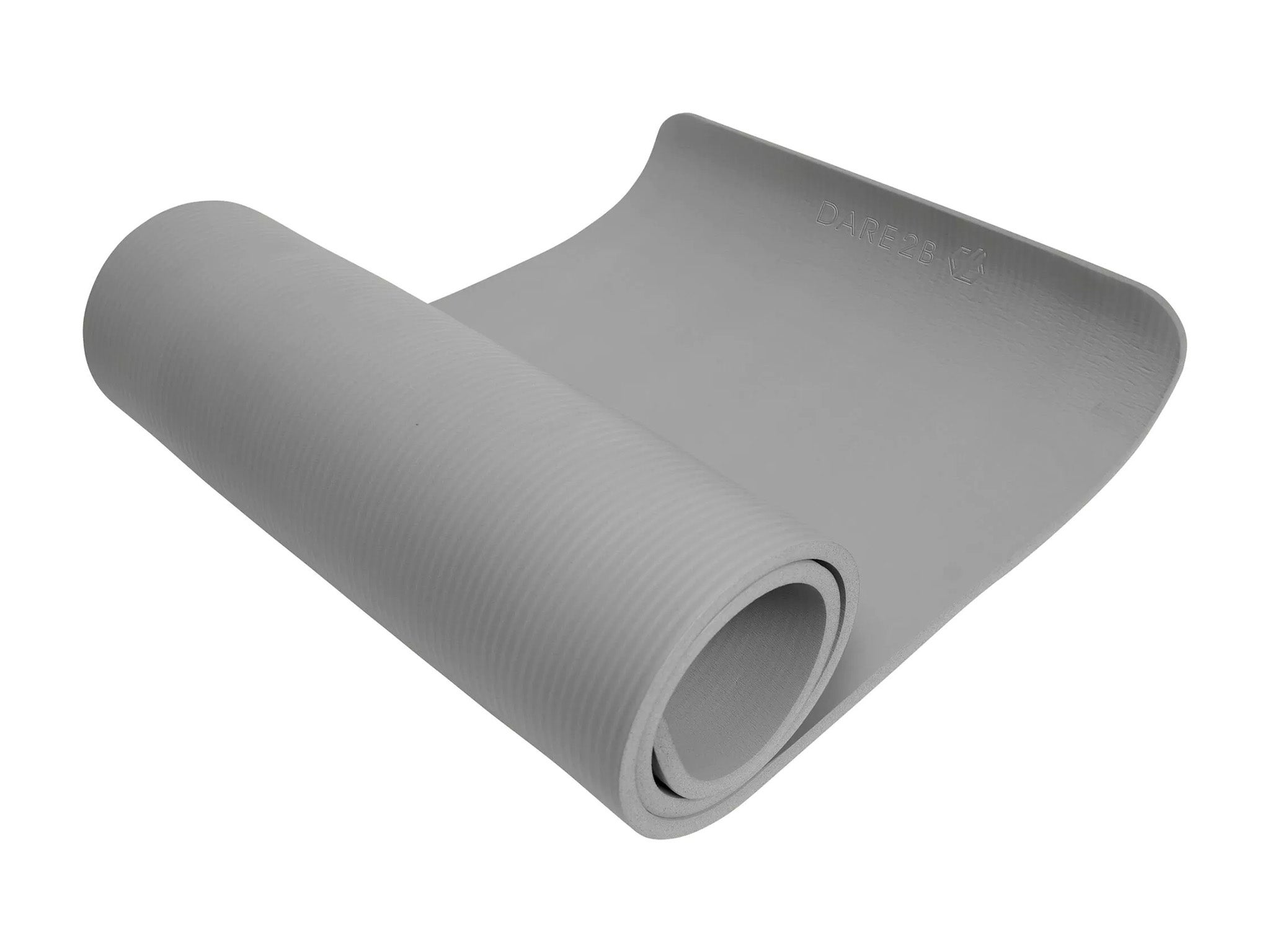
- Best: Lightweight yoga mat
- Size: 183cm x 63cm
- Thickness: 4mm
- Material: Polyvinyl chloride
- Non-slip: No
- Easy to transport: Yes, it’s lightweight, just add a strap (not included)
- Why we love it
- Very light
- Soft and cushion-like
- Take note
- Doesn’t come with a strap
- Can become slippy
Incredibly lightweight, this yoga mat is great for those wanting an option that’s easy to cart around. It’s also incredibly soft, showing an imprint of any hand or foot placed onto it – it really does absorb any shock, making it great for those with sore joints.
Due to it being super lightweight it also does roll up a little at the edges with no extra weight to hold it down. However, this cloud-like quality does make it great for travelling and taking with you to your classes.
Made from polyvinyl chloride with a smooth surface, it can get rather slippy after an especially sweaty session, so be sure to have a towel to hand.
For all its great travel credentials, on the website, it looks like this yoga mat comes with a strap, which it doesn’t, so be sure to buy one if you do wish to travel with it.
La Pochette whenever wherever yoga mat
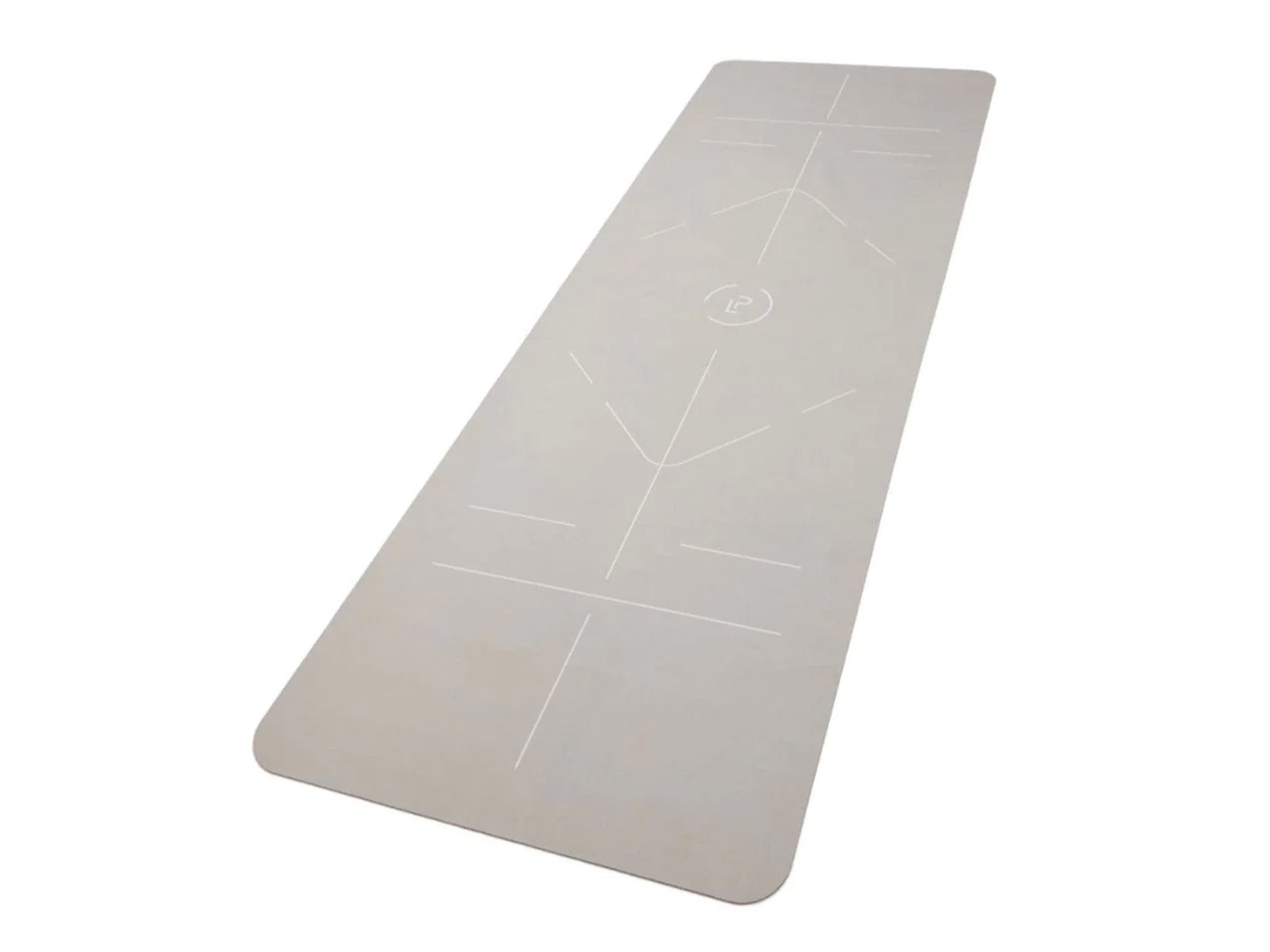
- Best: Travel yoga mat
- Size: 183cm x 61cm
- Thickness: 1.5mm
- Material: Microfibre and rubber
- Non-slip: Yes
- Easy to transport: Yes
- Why we love it
- Helpful markers for position
- Silky suede texture
- Take note
- Very thin
The name of this yoga mat gives the game away – it’s the perfect one to pick if you’re always out and about with your practice. At just 1.5mm thick, the super soft suede-feel mat can fold flat into any gym bag, or roll into an incredibly lightweight and thin tube.
The microfibre suede is an interesting departure from the rubber and PVC mats you might be used to but it feels lovely and soft under the hands and feet. However, at just 1.mm in thickness, it doesn’t offer the most protection for those with sore joints, knees or elbows, so be sure to stay away if this is you.
For the rest of us, we’re dubbing this a game-changer for outdoor exercise in particular, and you can even pop it in the washing machine at 30C. What more could we ask for?
The mat also comes with carefully-placed markings that help you to place your hands and feet, keeping your form in check – especially useful if you’re not practicing in your usual environment.
Corkspace pro cork yoga mat
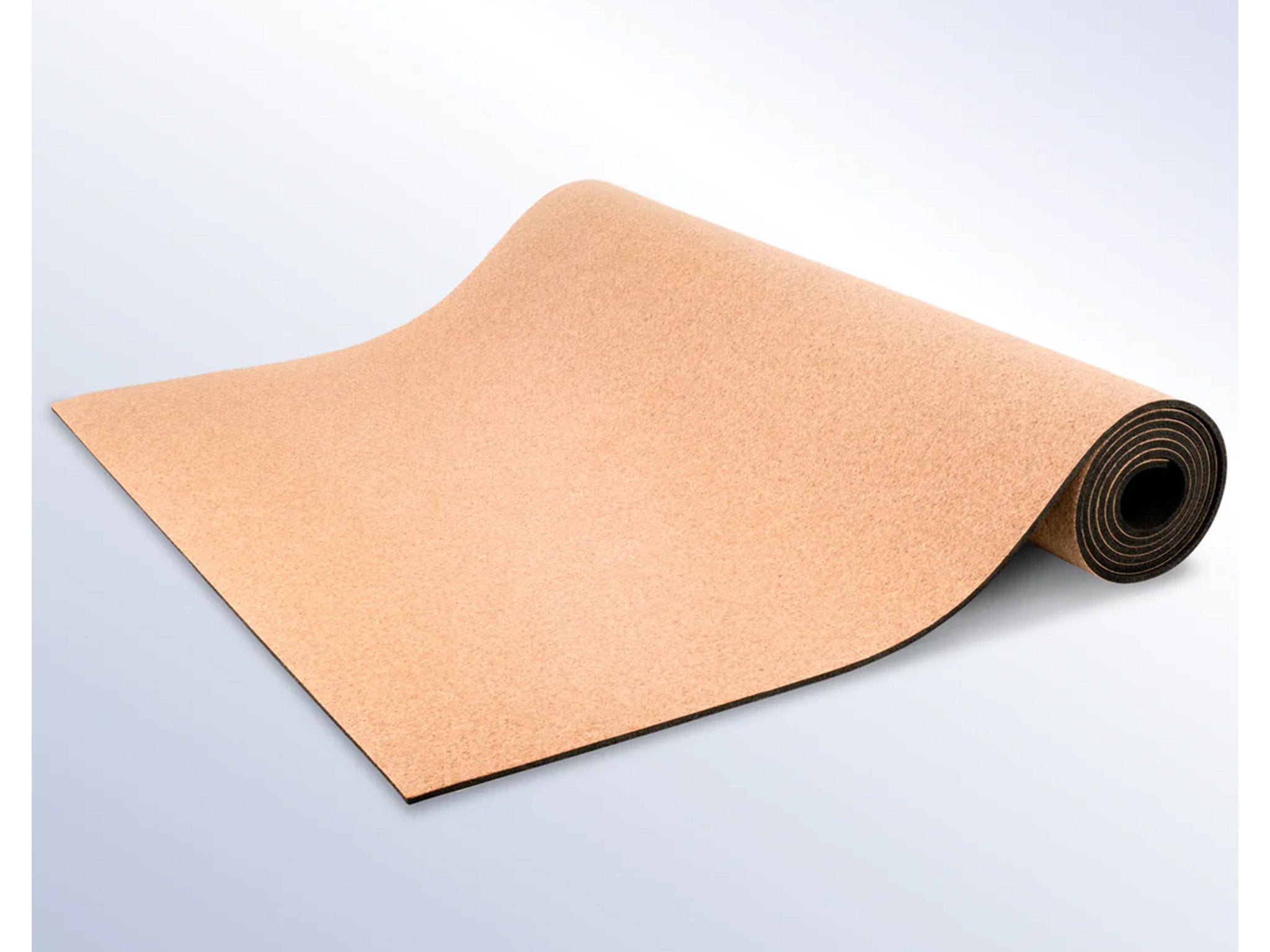
- Best: Cork yoga mat
- Size: 183cm x 61cm
- Thickness: 4.5mm
- Material: Cork and natural rubber
- Non-slip: Yes
- Easy to transport: Yes, comes with travel strap
- Why we love it
- Great grip
- Natural antimicrobial properties
- Comes with a travel strap
The Corkspace yoga mat continues to impress us, day after day. While it is on the pricier side, we promise you won’t be disappointed.
Made from natural grounding rubber and soft cork, it protects your body from the ground, whether you’re crouching in crow or attempting an inversion. Cork has natural antimicrobial properties and naturally helps to wick moisture away so is a brilliant material for a yoga mat, especially if you prefer to opt for something natural.
While we’ll confess to having incredibly sweaty hands and feet, we found this mat to have the best grip out of any yoga mat we’ve tried, and there are no annoying bumps, thanks to the heaviness of the material.
So, whether you’re diligent about doing your daily downward dog or are new to pilates or yoga, this piece of kit will be a great aid. The brand also stocks small accessories, such as a cork massage ball (£12, Corkspace.co.uk), to add an extra dimension to your practice, too.
Myprotein yoga mat
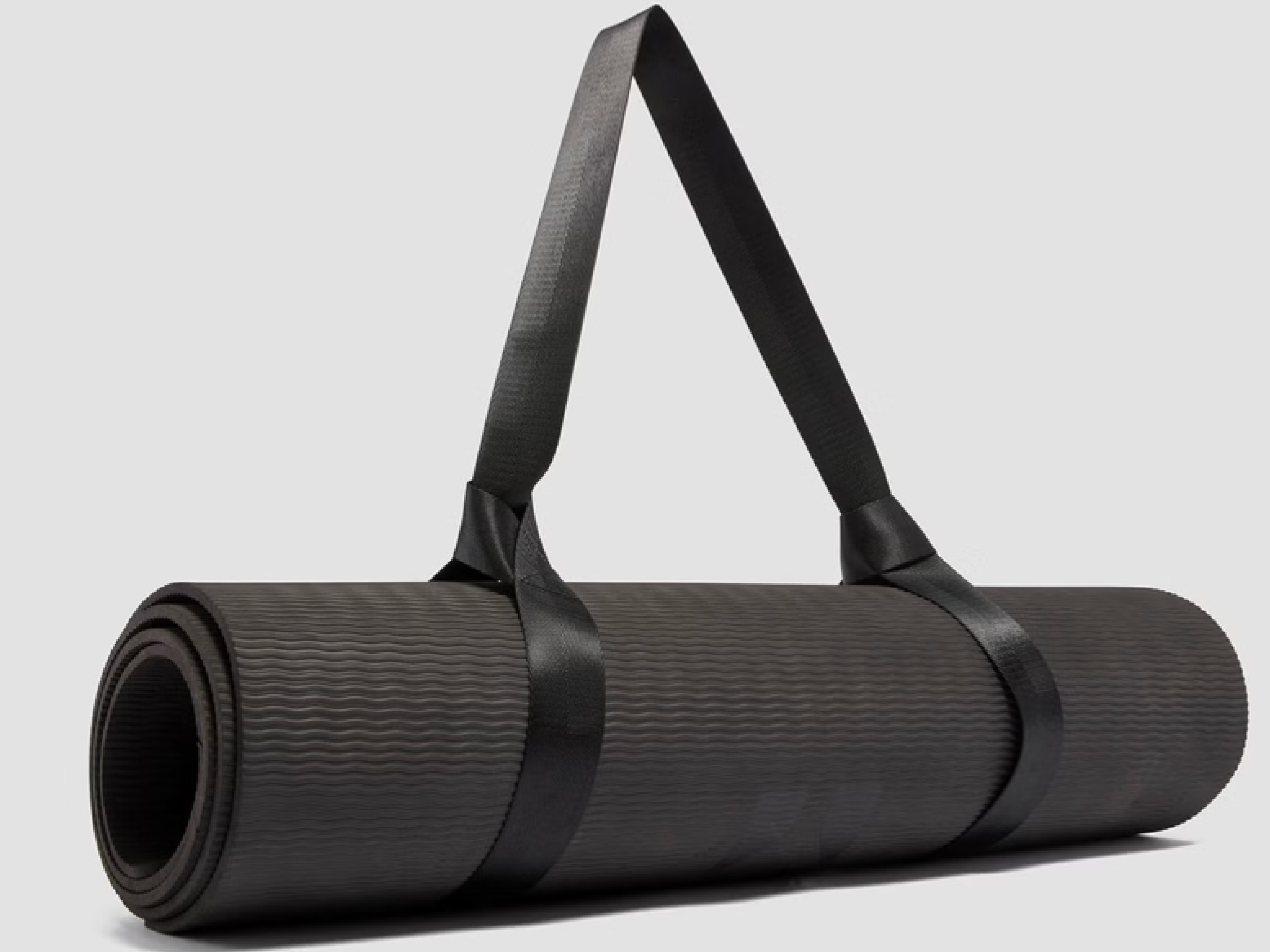
- Best: Affordable yoga mat
- Size: 183 x 61cm
- Material: High-density foam
- Non-slip: Yes
- Easy to transport: Yes, comes with a strap
- Why we love it
- Affordable
- Very lightweight
- Textured on both sides
At 6mm thick, the Myprotein yoga mat offers nice density and bounce for an affordable price. Ideal if this is your first go with matwork and you aren’t quite sure what you need.
Made from high-density foam with a wave-pattern texture to ensure ample grip, this plain black mat is a great essential.
It’s also very lightweight so easy to transport to your classes or take with you when you travel. There’s also a little blank name space for you to label the mat as yours – which should stop you from getting it mixed up with anyone else’s in class or at the airport, a nice touch we thought.
Gymshark studio mat
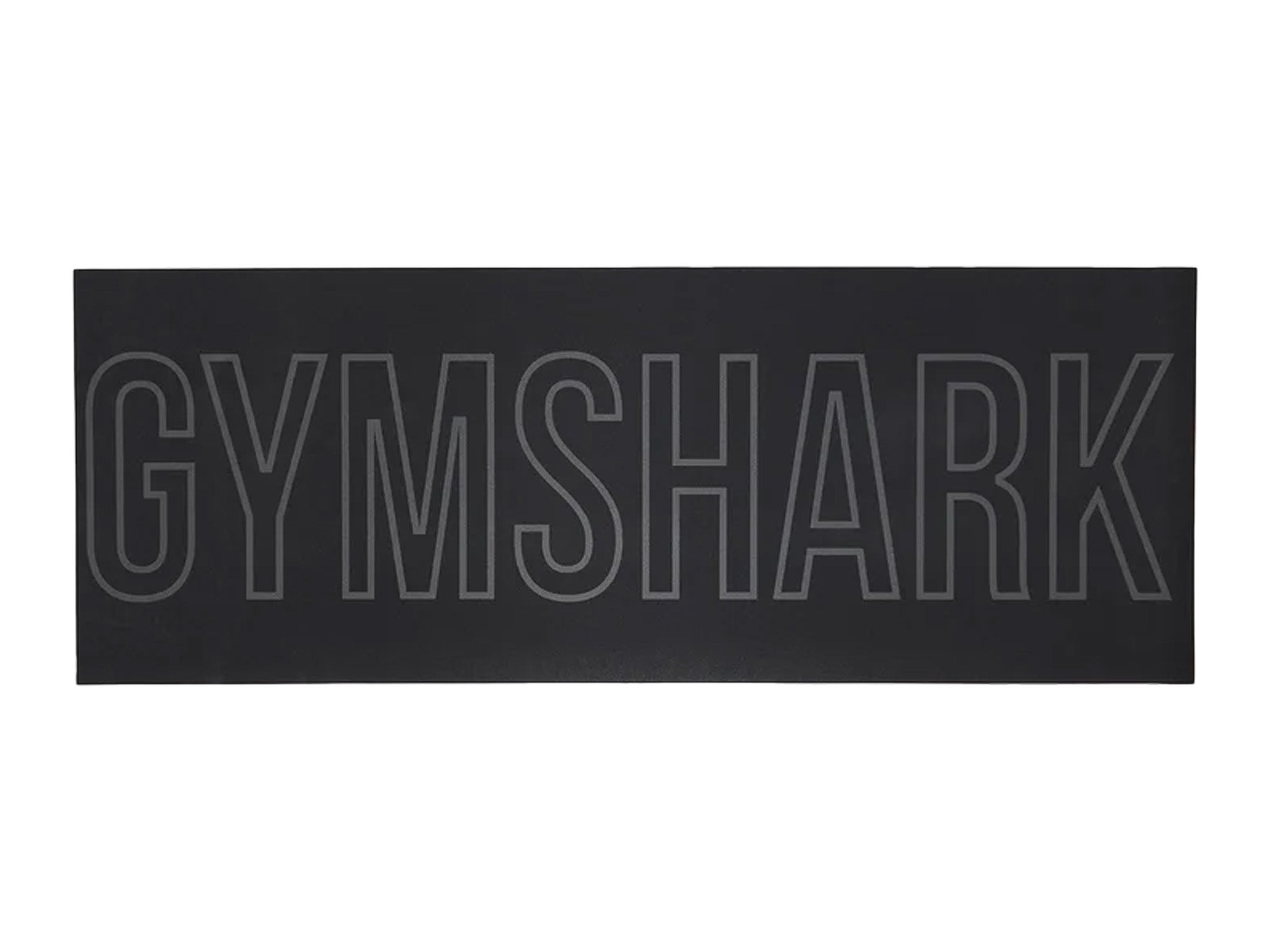
- Best: Rubber yoga mat
- Size: 180cm x 66cm
- Thickness: 3mm
- Material: Natural rubber
- Non-slip: Yes
- Easy to transport: No
- Why we love it
- Good grip
- Take note
- Quite heavy
- Doesn’t come with astrap
It’s safe to say Gymshark knows more than a thing or two when it comes to sweat sessions, so, of course, its yoga mat has been made to see you through the most challenging stretches in that hot yoga class.
If you’re after a rubber yoga mat, you won’t be disappointed. Rubber offers great natural grip and this mat has added texture to ensure you don’t slip out of place.
In basic black – pink and red options are also available – the large logo is striking, however it’s offset by the background colour and is in a muted shade.
It’s weighty enough that the corners don’t curl up, no matter how tightly you roll it. The only downside is it is on the heavy side, so be sure to buy an additional travel strap if you do wish to take it out and about.
Amp yoga mat
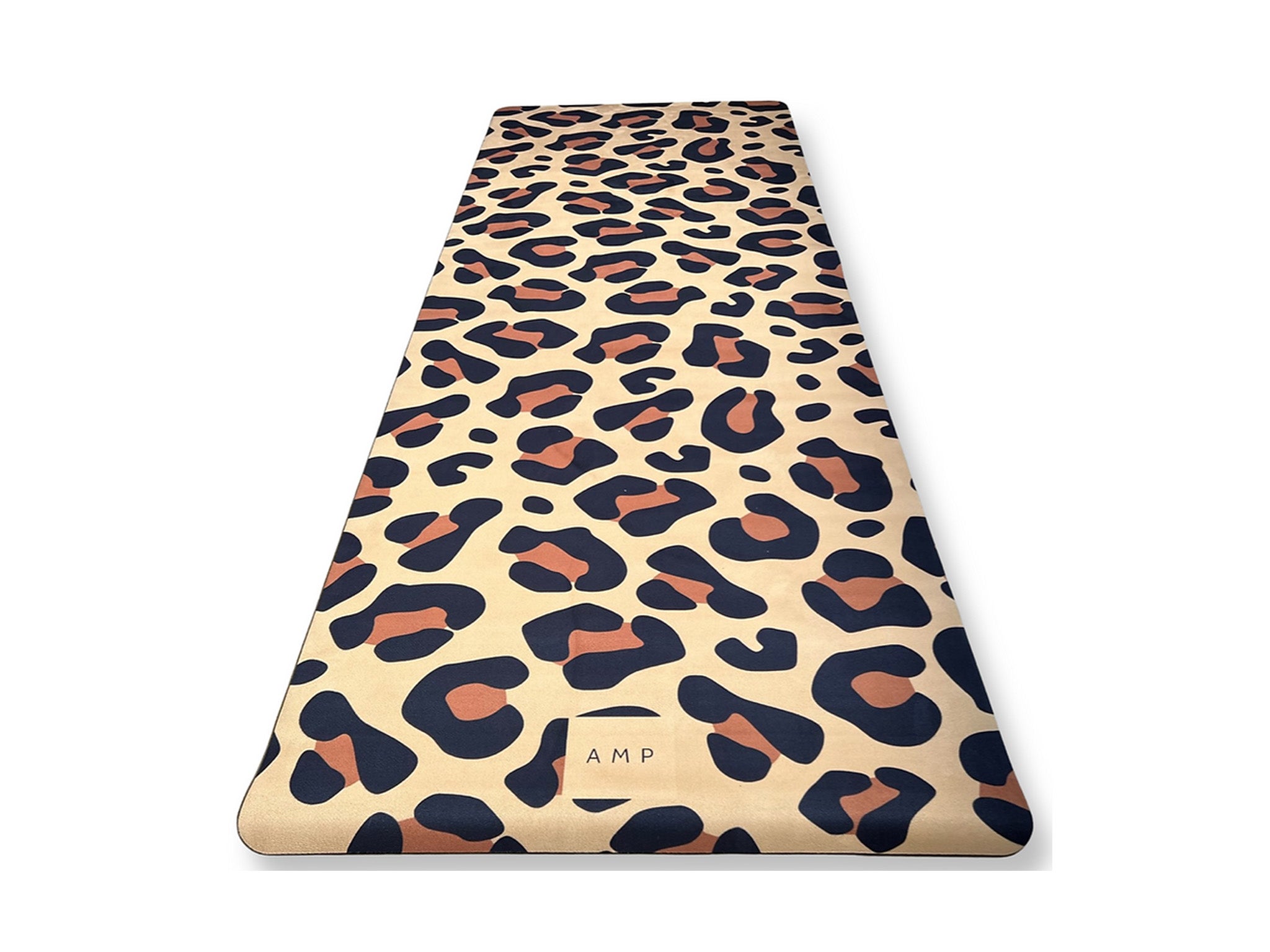
- Best: Patterned yoga mat
- Size: 183cm x 68cm
- Thickness: 4mm
- Material: Microfibre and natural rubber
- Non-slip: Yes
- Easy to transport: No
- Why we love it
- Looks great
- Good grip
- Take note
- Quite heavy
If you’re not a fan of plain block-colour styles, this yoga mat is sure to help you stand out from the crowd. In a fierce, fun leopard print, it’s beautifully designed and feels just as good as it looks.
Unlike your conventional yoga mats, this one is topped with vegan suede, giving it a very luxurious, soft and silky finish that we loved, and it was almost entirely slip-free – a huge bonus for hot yoga.
It’s a medium thickness at 4mm with a nice bounce to it and it feels pretty good under the knees and elbows thanks to the suedette finish. The downside is that it is rather heavy and doesn’t come with a travel strap, so may be best for at-home practise.
Peloton reversible workout mat
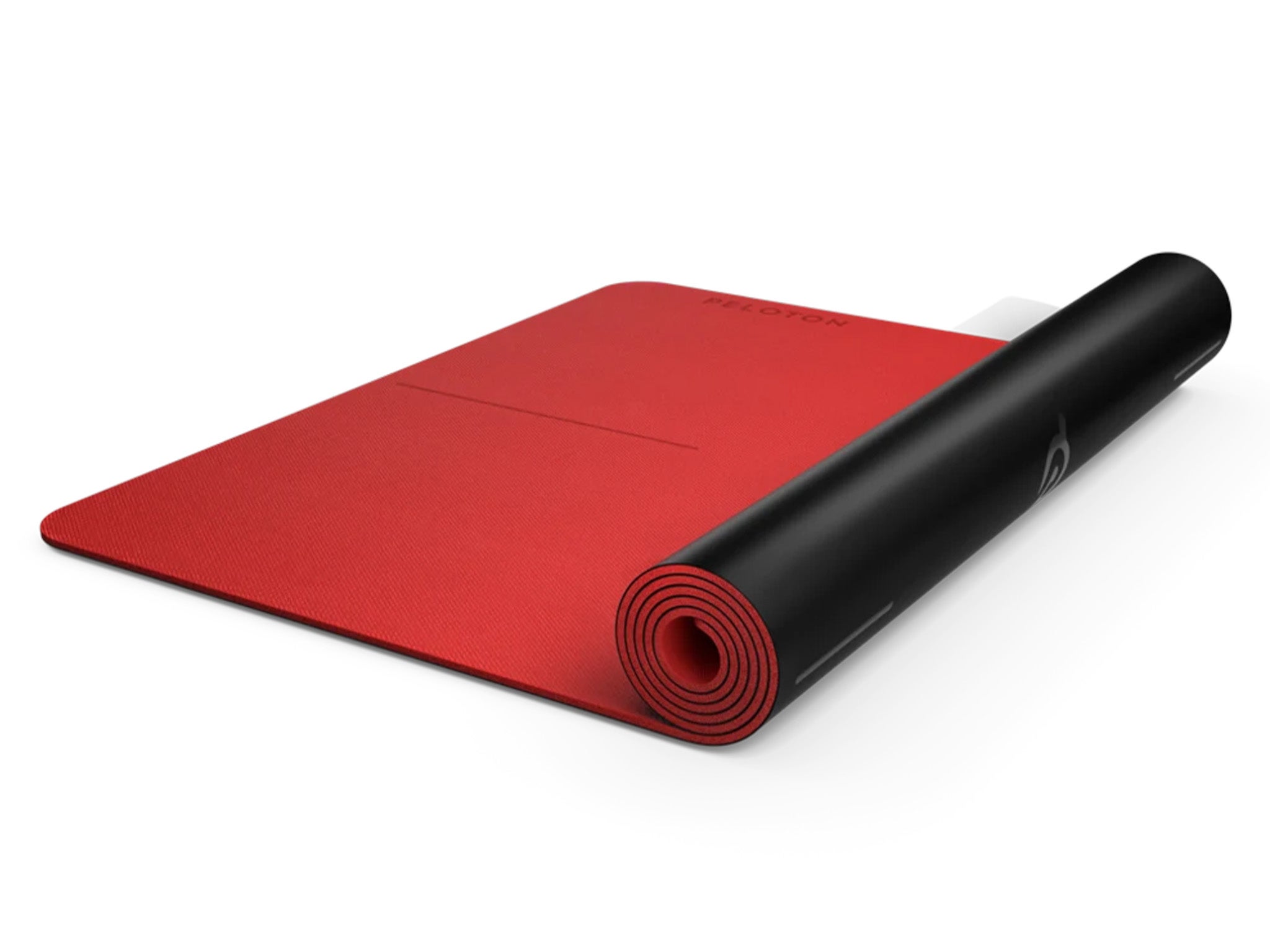
- Best: Reversible yoga mat
- Size: 180cm x 66cm
- Thickness: 5mm
- Material: Natural rubber
- Non-slip: Yes
- Easy to transport: No
- Why we love it
- Reversible for different needs
- Take note
- Quite heavy
Peloton needs little introduction. In fact, the online training classes have taken the world by storm, with both the brand’s treadmill and bike becoming must-have pieces of home-gym equipment.
What you may not know is that Peleton’s classes include a huge range of activities, from dance to yoga, and there’s a great range of products to accompany each one. This yoga mat is one of our favourite finds, and it offers a multi-purpose twist that can help you to diversify your at-home practice.
The red side is heavily textured for extra grip, while the black side is smooth yet completely slip-free. At 5mm thick, it offers medium-grade protection from hard floors.
The one downside is it isn’t the easiest to take out and about, but if you’re using it to follow one of Peloton’s classes at home, this won’t be an issue.
Fabletics essential yoga mat

- Best: For different styles at home
- Material: PVC
- Size: 183cm x 68.5cm
- Non-slip: Yes
- Easy to travel with: Yes (if you purchase a strap)
- Why we love it
- Good grip
- Stays flush with the floor
- Take note
- Doesn’t come with a strap
A lightweight essential with a textured almost sticky grip, the essential mat from Fabletics is a great all rounder for different types of yoga. Both sides feature a cross-hatch textured pattern to give your fingertips plenty to hold on to and this also keeps it in place on the floor.
The mat is a thin to medium thickness but surpringly weighty despite this so there are no rolling corners and it’s easy to fold or roll and store. This is helpful as it doesn’t come with a storage strap or carry strap so if you’re planning to take this mat out of the house you’ll have to purchase a travel strap separately.
There’s also a discount for Fabletics members which can make this mat much more affordable – it’s £25.60 for members. But at its non-member price it’s a great all rounder for at-home sessions.
Kati Kaia Aurelia gallery yoga mat
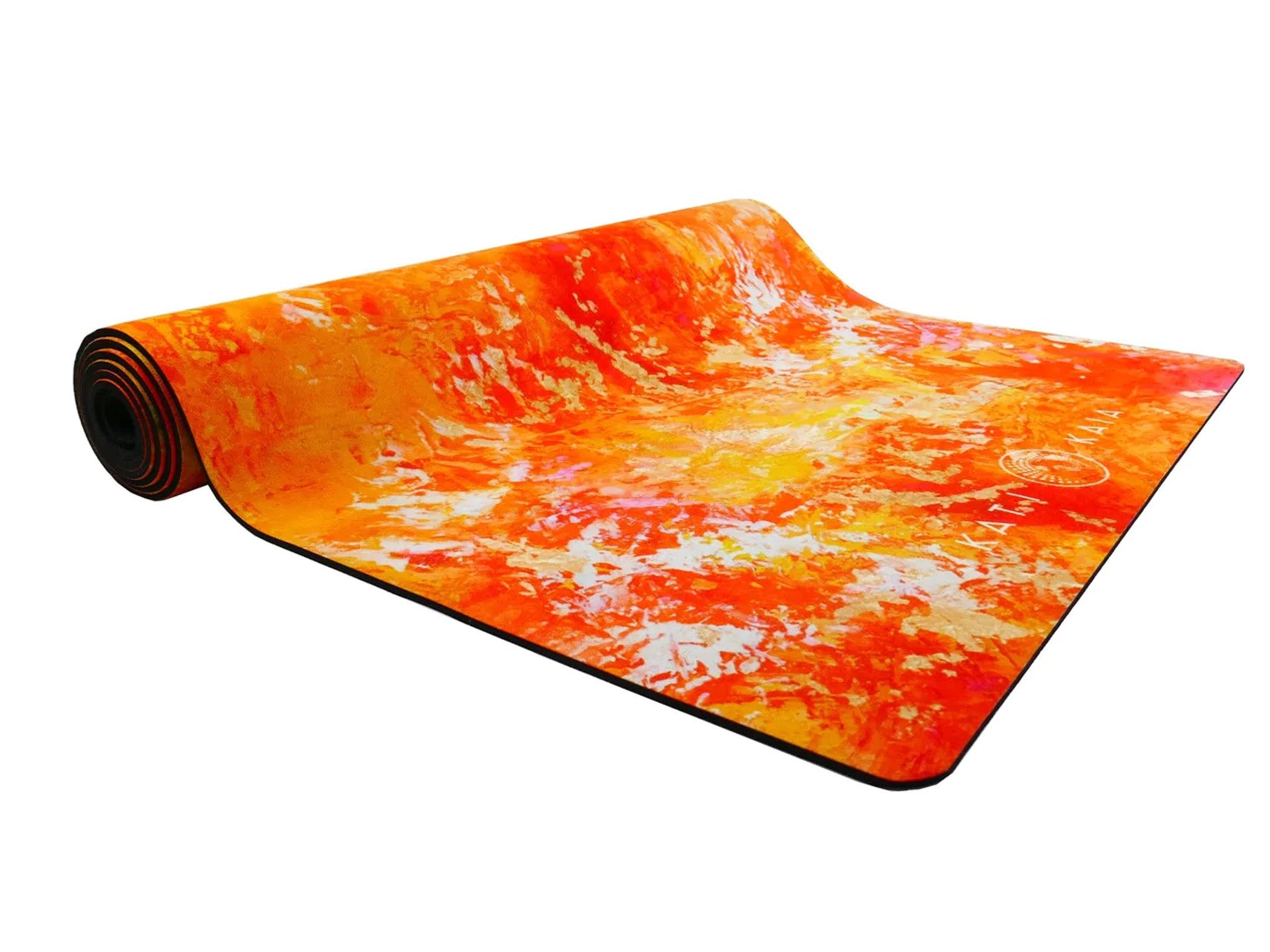
- Best: Luxury yoga mat
- Size: 183cm x 66cm
- Thickness: 4.5mm
- Material: Vegan suede and natural rubber
- Non-slip: Yes
- Easy to transport: Yes, comes with travel strap
- Why we love it
- Colourful design
- Smooth suede-like texture
- Take note
- Quite heavy
Made from vegan suede crafted from recycled plastic bottles and natural rubber, this mat from Kati Kaia is soft, supple and and packs a punch where design is concerned too.
The 4.5mm thickness provides medium cushioning and the rubber offers a nice spring. These suede-style mats aren’t for everyone but if you prefer a softer, more luxurious feeling under your hands and feet that still gives good grip, this mat is a great choice.
There’s also a handy travel strap included so you can take this mat anywhere, and let’s be honest, you’ll probably want to bring it with you to class because of how cool it looks.
Adidas training mat
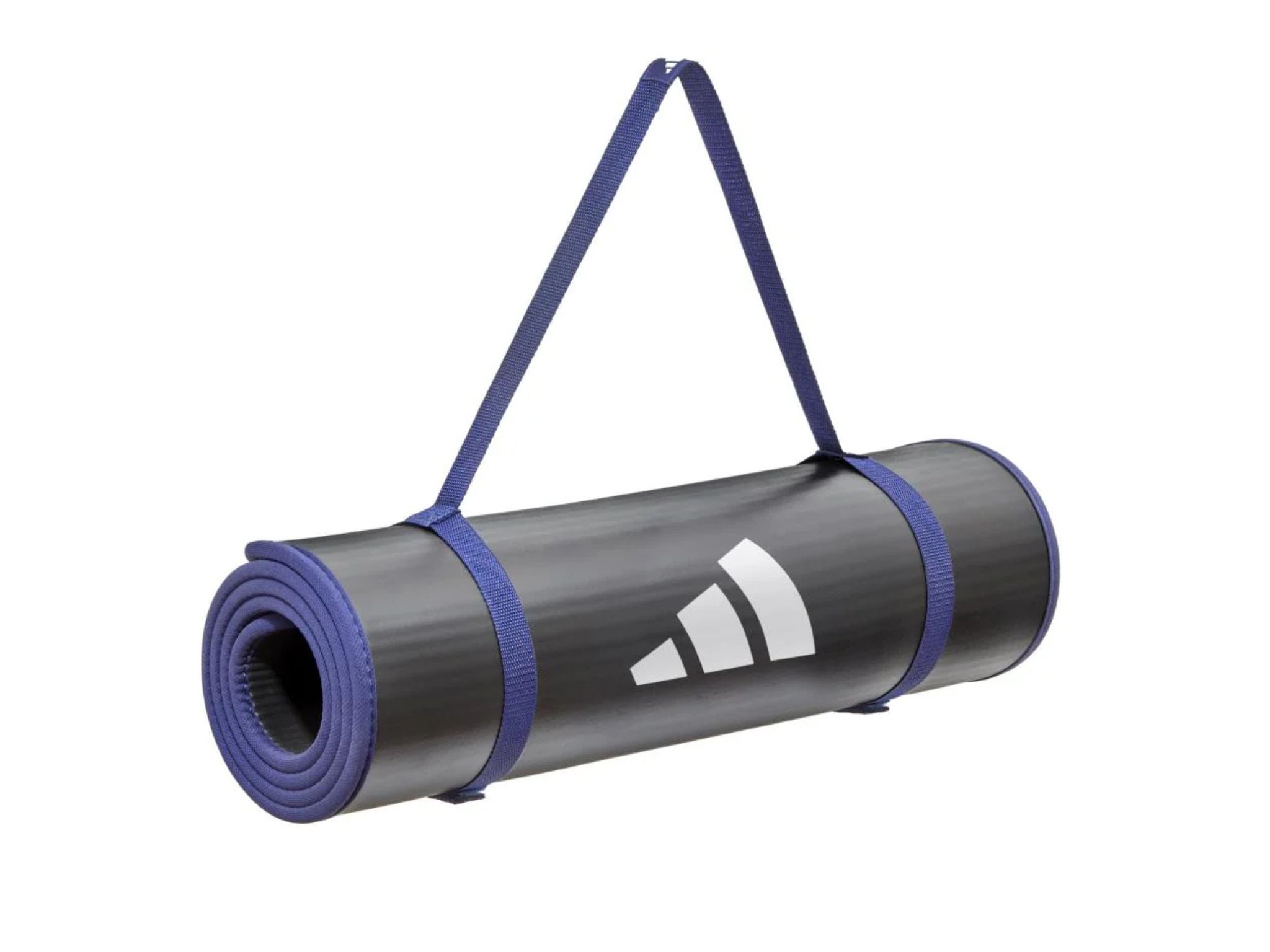
- Best: For exercise
- Materials: NBR (nitrile butadiene rubber) material
- Size: 183cm x 61cm
- Thickness: 10mm
- Easy to travel with: Yes
- Why we love it
- Plenty of cushioning for exercises like burpees
- Comfortable for lying poses on hard floors
- Comes with a travel strap
- Take note
- Thick material doesn’t give good ground feel
- Mat stretches slightly in poses like downward dog
This plush customer falls more into the exercise mat category, but can be used for yoga too. It’s twice as thick as your average yoga mat, with 10mm of NBR rubber providing plenty of cushioning. As a result, we found it was incredibly comfortable for lying poses, whether we were using it indoors, outside or on an unforgiving stone floor. The added thickness also felt fantastic for HIIT workout mainstays like burpees and lunges, providing a soft landing when we were required to hit the deck.
However, this mat’s biggest strength (the ample cushioning) is also its most significant shortcoming. The 10mm mat doesn’t offer great ground feel for grippy poses where you’re placing your weight through your hands, such as downward facing dog and crow. If your hands are pushing forward while in a downward facing dog pose, the mat can also stretch slightly, reducing stability.
For these reasons, we would recommend it for people who want an exercise mat they can also use for occasional stretching or Pilates and yoga. It could also make a good fit for those who prefer less active practices such as yoga nidra, or want to protect sore joints from hard floors.
Fiit training mat
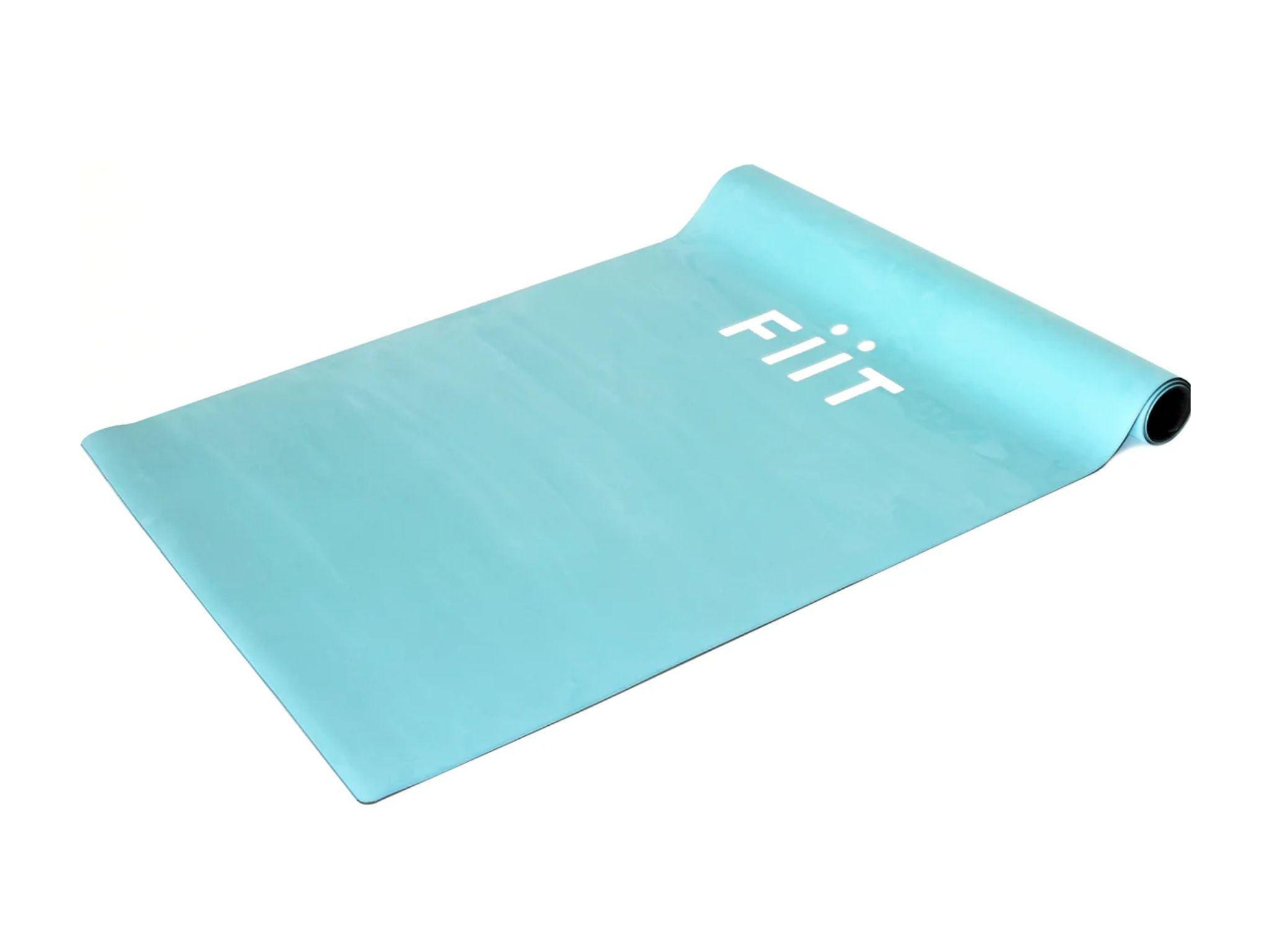
- Best: Large yoga mat
- Materials: Recycled rubber
- Size: 180cm x 90cm
- Thickness: 5mm
- Easy to travel with: No
- Why we love it
- Large surface area
- Durable
- Made from recycled rubber
- Take note
- Hard to travel with due to its size
- Not the grippiest
The average yoga mat is about 60cm wide. This Fiit mat boasts another 30cm beyond this, giving you more space for stretching and complex flows.
We loved the larger surface area for all forms of exercise – we never needed to rearrange our body during a yoga class to stay on the mat, or worry about missing the mat with our hands when dropping into the press-up position during a class.
The recycled rubber underside of the mat was brilliantly sticky, not budging on any surface (even slippery laminate floors). And the suede-like top layer is incredibly durable, surviving a multitude of indoor and outdoor classes (as well as unwanted attention from the claws and teeth of our writer’s dog) with little more than a few scuffs to show for it.
The mat didn’t offer as much grip as others on this list, and its larger size means it’s tricky to roll up and take with you on the go. But if you’re after a larger, robust mat, this is a great option at a fairly affordable price.
Alo Warrior mat
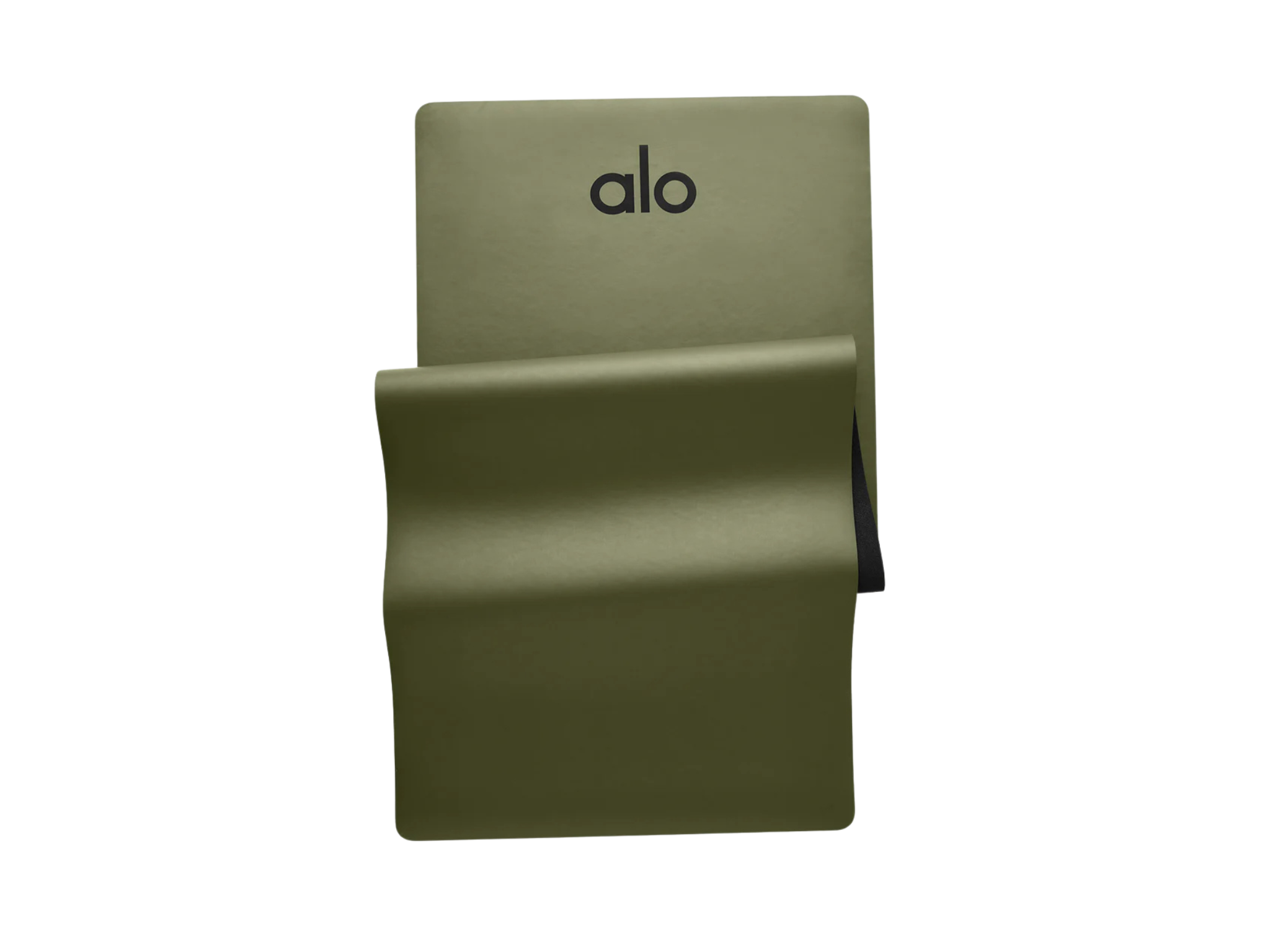
- Best: For grip
- Size: 188cm x 67cm
- Thickness: 5mm
- Material: Natural rubber, polyurethane
- Non-slip: Yes
- Easy to transport: No
- Why we love it
- Very grippy
- Provides great cushioning
- Cool colour choices
- Take note
- Expensive
While this is one of the more expensive mats on this list, it’s also one of the best. At 5mm thick, the Warrior mat from Alo offers medium thickness yet feels springier and more cushioned than other 5mm mats we’ve tried.
Made with ethically sourced natural rubber and polyurethane leather it offers amazing grip so it’s an ideal choice if you tend to slip or suffer with sweaty hands when you’re holding your poses. The finish also wicks moisture away and is formaldehyde-free and PVC-free so its non-toxic credentials are well up to scratch.
The only drawback is that this mat is a little heavy and doesn’t come with a carry strap so is best suited to at-home sessions. Available in four cool colourways from jungle green to smoky quartz, it blends form and function beautifully.
Bala The play mat
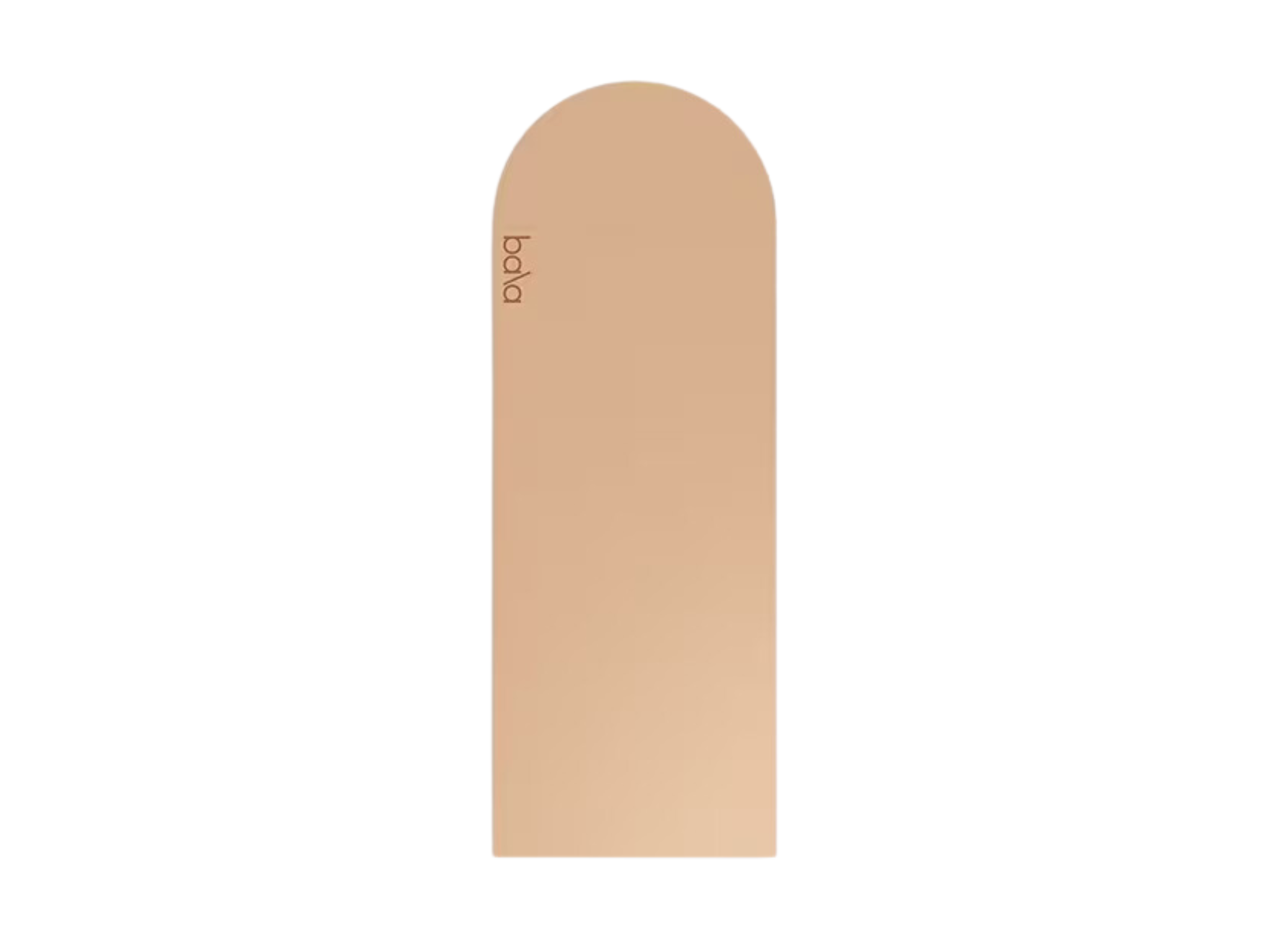
- Best: Best for design
- Size: 180cm x 67cm
- Thickness: 8mm
- Non-slip: Yes
- Materials: Rubber, polyurethane
- Easy to travel with: No
- Why we love it
- Extra thick
- Cool design
- Hardwearing
- Take note
- Expensive
Touted by the brand as ‘the world’s most comfortable mat’, the play mat by Bala is 8mm thick to ensure a comfortable practice. While this level of thickness might not suit everyone, it does make a session on a hard floor that much easier.
Our tester found that it was well suited to a range of yoga styles and to Pilates and training with a resistance band. However, the thickness did interferre a little with balance in certain poses.
The design and luxe finish at the edges certainly makes up for other shortcomings as this is one of the cooler looking mats and it feels premium. Made from FSC-certified natural rubber and high-grade polyurethane, it’s very grippy and prevents any slipping.
The mat is also pretty hardwearing and easy to clean so the higher price point will hopefully ensure that you don’t have to replace your mat after a year of use, which can often be the case with cheaper foam-style mats.
The verdict: Yoga mats
Yoga mats come in all shapes and sizes, so be sure to select one that works best for you and your practice. No matter if you’re a beginner or best in class, there are great options to suit you in every style. If you’re keener on a natural material, you can’t go wrong with Corkspace’s cork mat, however, if you’re not as concerned with the coating material, our best in show is the Onyx mat. For a more affordable everyday option, the Myprotein yoga mat won’t steer you wrong.
If you regularly take your practice out and about, the La Pochette whenever wherever yoga mat couldn’t be easier to carry around. And the Amp yoga mat’s loud leopard print will inject some personality into even the most serene of practices and that suede-style texture will feel great when you’re lying down blissed out at the end of your practice.
Yoga mat FAQs
What type of yoga mat do I need to buy?
Different mat materials have different lifespans and varying levels of grip, explains Cat Meffan, yoga teacher and founder of the Soul Sanctuary. You have various options ranging from natural rubber to rubberlike PVC and plastic coatings. Each offer a different style of grip and the addition of grooves and textures can make a difference to the efficacy of the material too.
Materials like cork offer natural antimicrobial properties so they’re great for an option that wicks moisture away and won’t leave you sliding around in a pool of your own sweat. However, they do degrade quicker than something like a PVC mat.
“Some materials such as cork are great, but more so for hot yoga classes, or very dynamic flows when you know you’ll get sweaty. When buying a ‘yoga towel’ or hot yoga mat, be aware that these are often only 1-2mm thick, so you’ll want to have another mat to pad underneath.” says Meffan.
Rubber is another great natural material that offers plenty of grip and natural bounce, especially on a hard floor, however, they do wear down after a while too. Meffan explains that, “Smooth, recycled rubber mats are amazingly grippy at the start but, on average, they will last for around 300-400 practices. If you’re someone that does yoga everyday, this might feel a little excessive to be buying a new mat each year.”
What thickness of yoga mat do I need?
“Thickness definitely matters”, says Meffen, “especially if you like extra padding under the knees and spine. But bear in mind that the thicker the mat, the heavier it will be.” While thicker mats are good for using at home, they may be too much for carrying to the gym.”
A yoga or Pilates mat can range from anywhere from 1mm to 12mm in thickness so consider whether you want something foamy or bouncy, something that absorbs shock and cushions joints, or offers spring and stable underfoot support.
Why is it important to use a yoga mat?
While you don’t need to use a mat, mats can provide support for your joints, cushion your bones and help you to keep your body aligned within the edges of the mat, which can make your practice easier. “Yoga mats were created to enhance the practice of yoga and they do a great job of it. If someone had the choice of doing yoga without a mat or not doing yoga at all, I would always urge them to just start.” says Meffen.
“There are many asanas that don’t require a high-grip yoga mat, and let’s not forget that meditation and pranayama are a huge part of yoga, for which we can sit on a cushion or a chair.”
What type of yoga mat is best for beginners?
Before buying your first yoga mat, there are a few things you need to consider. Firstly, think about what type of floor it will be used on. If the mat doesn’t have enough grip, if you place it on hardwood or tiled floors it may be difficult to balance in various poses.
Additionally, a non-slip mat will be helpful when working up a sweat or when practising hot yoga in a heated room. If you plan to transport your mat between your home and classes, look for one that’s lightweight and rolls up easily.
What thickness mat is best for yoga?
Thicker yoga mats are a great option to provide extra support for anyone who suffers from knee pain, sensitive wrists or is looking to practise hatha or restorative yoga.
Most standard yoga mats usually measure 3mm thick, while a thick yoga mat starts at approximately 5mm. However, the most important thing to consider when picking one is your own personal comfort.
How to clean a yoga mat
Depending on how often you practise and the intensity of your sessions, you can usually go a week or so before your mat needs a thorough clean. But, if you tend to sweat a lot or find that your mat retains an odour, it is best to clean it more often.
For a quick spot clean, you can buy ready-made antibacterial sprays that are designed to be used on both sides of the yoga mat, to kill any germs and eliminate odours. Alternatively, you can mix a few drops of mild dishwashing liquid and two cups of warm water into a spray bottle.
It is also important to check your mat’s specific cleaning recommendations. While some can be spot cleaned only, others are hand-washable and some can even be put in the washing machine on a gentle cycle.
Is there a difference between a fitness mat and a yoga mat?
While it is fine to use just one mat for all forms of exercise, there is a difference between fitness and yoga mats. Those designed solely for yoga are often thinner, longer and have more grip, while standard exercise mats can be a bit thicker to offer extra support for higher-impact workouts.
What materials should I look for in an eco-friendly yoga mat?
A lot of yoga mats contain PVC – a plastic known as polyvinyl chloride – which is what gives them a slight chemical smell when rolled out. If you’re looking for a mat that’s kinder to the planet, you can avoid this material. More eco-friendly options include yoga mats made from natural rubber, cork, cotton or jute.
Make your practice even more comfortable with our pick of the best yoga pants and leggings
Voucher Codes







